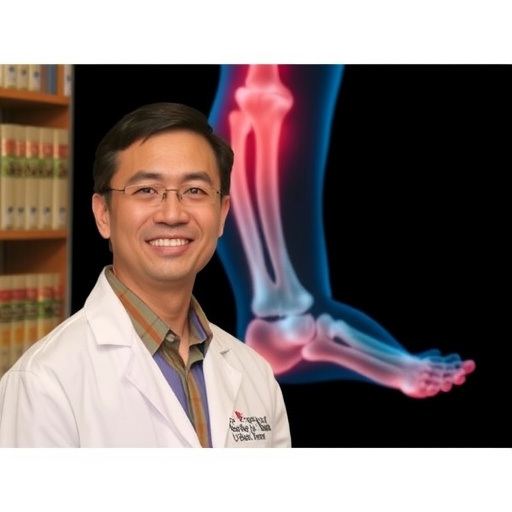Osteosarcoma, a highly aggressive bone cancer predominantly affecting children and young adults, presents formidable challenges in clinical oncology due to its poor prognosis once metastasized, especially to the lungs. Survival rates plummet drastically to approximately 20-30% in such advanced stages, underscoring a dire need for innovative therapeutic modalities. Current antiproliferative interventions have remained relatively stagnant since the 1980s, highlighting a critical void in effective treatment strategies.
Dr. Balakrishna Koneru, an assistant professor of pediatrics at Texas Tech University Health Sciences Center (TTUHSC), is spearheading pioneering research aimed at transforming the clinical landscape of osteosarcoma management. His work recently received significant endorsement via a two-year, $198,822 grant from the Cancer Prevention and Research Institute of Texas (CPRIT), dedicated to fostering original and regional cancer research, particularly in historically underserved areas over 100 miles from recognized National Cancer Institute (NCI)-designated centers within Texas.
Dr. Koneru’s investigative project zeroes in on a molecular subtype of osteosarcoma cells distinguished by the activation of an alternative telomere elongation mechanism, termed ALT (Alternative Lengthening of Telomeres). Telomeres, protective caps at chromosome termini, progressively shorten during normal cellular division, ultimately triggering senescence. Cancer cells evade this limitation primarily by reactivating telomerase, an enzyme that replenishes telomere length, thereby enabling unchecked proliferation. However, a subset of cancers, including a significant fraction of osteosarcomas, exploit a telomerase-independent pathway via ALT, a homologous recombination-based telomere maintenance process that remains poorly understood and therapeutically untargeted.
Recent advances led by Dr. Koneru’s team employed high-throughput CRISPR-Cas9 genomic screening techniques to systematically disrupt numerous genes and elucidate their roles in sustaining the viability of ALT-positive osteosarcoma cells. This comprehensive functional genomics approach identified Integrin Subunit Alpha V (ITGAV) as a critical molecular player indispensable for the survival of these tumors. The ITGAV protein is a transmembrane receptor involved in cell adhesion, migration, and intracellular signaling cascades, functions that are often hijacked by malignant cells for metastatic progression and resistance to apoptosis.
The grant-funded research aims to mechanistically characterize the dependency of ALT-driven osteosarcomas on ITGAV. Experimental strategies will encompass targeted gene editing, in vitro tumor cell viability assays, and in vivo modeling to delineate the impact of ITGAV disruption on tumor growth dynamics. By elucidating the downstream signaling pathways modulated by ITGAV, the study aspires to reveal vulnerabilities that could be exploited to design targeted therapeutics.
An outstanding facet of this investigation is its potential for clinical translation. Should ITGAV prove to be an effective therapeutic target, pharmaceutical development efforts could be directed toward small molecule inhibitors or monoclonal antibodies specifically intercepting ITGAV function. Such interventions could represent the first tailored treatment option for ALT-dependent osteosarcoma patients, who currently have limited alternatives beyond surgery and conventional chemotherapy.
Moreover, the implications of this work may extend beyond osteosarcoma. Several other sarcomas and aggressive pediatric cancers, including certain neuroblastomas, exhibit high prevalence of the ALT phenotype. Thus, therapeutic strategies derived from understanding ITGAV’s role could have broader oncological relevance, paving the way for novel treatments for a range of hard-to-treat malignancies characterized by ALT-based telomere maintenance.
Dr. Koneru emphasizes the novelty and critical nature of this research, which resides at the intersection of cancer biology, molecular genetics, and translational medicine. The integration of cutting-edge CRISPR technology with a focused inquiry into telomere biology exemplifies the innovative approaches needed to tackle cancers that have eluded standard treatment for decades.
The CPRIT Texas Regional Excellence in Cancer Pilot Study Award facilitates this exploratory research by providing resources to amplify Dr. Koneru’s preliminary findings concerning ITGAV’s indispensability in ALT-positive osteosarcomas. This support is instrumental in enabling detailed mechanistic studies and validation necessary to substantiate ITGAV as a viable drug target.
Ultimately, the success of this initiative could transform the therapeutic paradigm for pediatric and young adult osteosarcoma patients, transforming a fatal diagnosis into a manageable or potentially curable disease. By addressing an understudied and molecularly distinct subclass of osteosarcoma, Dr. Koneru’s research opens new vistas in personalized oncology and targeted drug development.
This endeavor exemplifies the importance of regional cancer research initiatives in bridging gaps in cancer treatment innovation, particularly for underserved populations distant from major cancer centers. The findings from this work not only promise advances in cancer therapeutics but also reinforce the value of strategic funding to propel novel scientific exploration in neglected domains.
The future trajectory includes not only expanding the understanding of ITGAV’s mechanistic role in ALT maintenance but also facilitating preclinical studies that could eventually culminate in clinical trials. As the oncology community continues to unravel the complexity of tumor biology, targeted interventions such as those proposed by Dr. Koneru stand at the forefront of personalized medicine for aggressive childhood cancers.
Subject of Research: Osteosarcoma, Alternative Lengthening of Telomeres (ALT), Integrin Alpha V (ITGAV), Targeted Cancer Therapy
Article Title: Investigating Integrin Subunit Alpha-V as a Therapeutic Target in ALT-Dependent Osteosarcomas
News Publication Date: Not Provided
Web References: Not Provided
References: Not Provided
Image Credits: TTUHSC
Keywords: Biomedical engineering, Clinical medicine, Diseases and disorders, Epidemiology, Health care, Human health, Medical specialties, Pharmaceuticals, Pharmacology
Tags: Alternative Lengthening of Telomerescancer prevention in underserved areaschildhood cancer prognosisclinical oncology advancementsCPRIT grant for cancer researchDr. Balakrishna Koneru researchinnovative cancer therapiesmolecular subtypes of osteosarcomaosteosarcoma treatment challengespediatric bone cancer researchtelomere elongation mechanismsTexas Tech University Health Sciences Center





